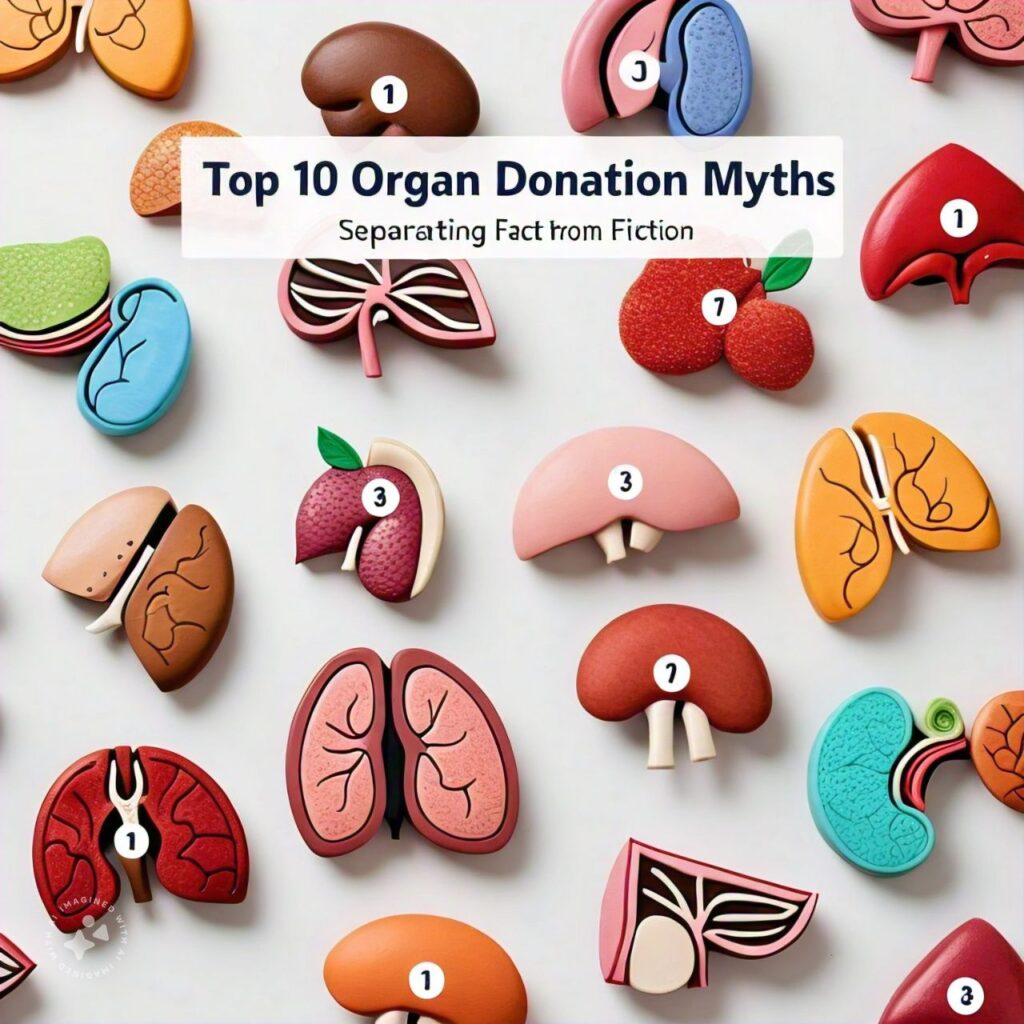Debunking 10 Common Organ Donation Myths

World Organ Donation Day, observed annually on the 13th of August, is a global event aimed at raising awareness about the life-saving potential of organ donation. Organ donation is a life-saving act that has the potential to give hope and a second chance at life to those in need of transplants. However, despite the many benefits of organ donation, numerous myths and misconceptions continue to circulate, preventing people from registering as donors. This article aims to debunk some of the most common myths about organ donation, providing clarity and encouraging more people to consider becoming organ donors.
Table of Contents (Click to Open)
Organ Donation Myth 1: Doctors Won’t Try as Hard to Save You If You’re an Organ Donor
One of the most pervasive myths about organ donation is the fear that medical professionals won’t work as hard to save your life if they know you are an organ donor. This belief is entirely unfounded. The primary responsibility of doctors and medical staff is to save lives. Organ donation is only considered after all possible life-saving measures have been exhausted and death has been legally declared. The team involved in your treatment is completely separate from the transplant team, ensuring that there is no conflict of interest.
Organ Donation Myth 2: Organ Donation Is Against My Religion
Another common misconception is that organ donation is prohibited by certain religions. In reality, most major religions support organ donation as an act of charity, compassion, and love for others. For example:
- Christianity: Many Christian denominations view organ donation as an expression of love and a means of fulfilling the commandment to love one’s neighbor.
- Islam: Islamic scholars have generally supported organ donation, provided it is done with the donor’s consent and does not involve the sale of organs.
- Hinduism: Hindu texts emphasize the importance of helping others, and organ donation is considered an honourable act.
- Judaism: While views can vary, many Jewish authorities approve of organ donation, especially when it saves a life.
It’s essential for individuals to consult with their religious leaders if they have concerns, as many religions have issued supportive statements regarding organ donation.
Organ Donation Myth 3: I’m Too Old or Unhealthy to Donate My Organs
Many people believe that age or existing health conditions automatically disqualify them from being organ donors. However, this is not the case. There is no age limit for organ donation; successful transplants have been performed with organs from donors in their 70s and 80s. Similarly, having a medical condition does not necessarily preclude you from donating. Medical professionals evaluate each potential donor on a case-by-case basis, assessing the condition of the organs at the time of death. Even if certain organs are not suitable for transplant, other tissues such as corneas, skin, or bones may still be viable for donation.
Organ Donation Myth 4: My Family Will Be Charged for the Organ Donation Process
A common concern is that the donor’s family will have to bear the financial burden of the organ donation process. This is not true. The costs associated with organ donation, including the removal and transportation of organs, are typically covered by the recipient’s insurance or by the transplant program. The donor’s family is not responsible for any of these expenses, and the decision to donate does not affect funeral arrangements or costs.
Organ Donation Myth 5: Organ Donation Will Disfigure My Body
Some individuals worry that organ donation will disfigure their body, making it unsuitable for an open-casket funeral. In reality, organ donation is a surgical procedure carried out with great care and respect for the donor. Surgeons make incisions that can be closed and covered, similar to any other type of surgery, ensuring that the body is treated with dignity. Open-casket funerals are still possible after organ donation, and the donor’s appearance is preserved.
Organ Donation Myth 6: Wealthy or Famous People Receive Organs First
There is a misconception that wealth or fame can influence who receives a donated organ, with some believing that the rich or famous get priority on transplant lists. This is entirely false. The process of organ allocation is highly regulated and is based on strict medical criteria, including the severity of the patient’s condition, blood type, tissue compatibility, and the time spent on the waiting list. Factors such as wealth, social status, or fame do not play any role in determining who receives an organ.
Organ Donation Myth 7: My Organs Could Be Sold on the Black Market
The fear of organs being sold on the black market is another myth that deters people from becoming donors. In reality, the organ donation process is tightly regulated to prevent any such illegal activities. In most countries, it is illegal to buy or sell organs. The donation process is overseen by national and international organizations that ensure organs are allocated fairly and ethically. These safeguards are in place to maintain the integrity of the organ donation system and to protect both donors and recipients.

Organ Donation Myth 8: Only a Few Organs Can Be Donated
Some people mistakenly believe that only certain organs, like the heart or kidneys, can be donated. In fact, many different organs and tissues can be donated, significantly increasing the number of lives that can be saved or improved. Organs that can be donated include the heart, lungs, liver, kidneys, pancreas, and intestines. In addition, tissues such as corneas, skin, bones, tendons, and heart valves can also be donated. Each of these donations has the potential to make a profound impact on the lives of multiple recipients.
Organ Donation Myth 9: If I’m a Donor, I Can’t Have a Traditional Funeral
Some believe that if they donate their organs, they cannot have a traditional funeral. However, organ donation does not interfere with having an open-casket or any other type of funeral. The surgical procedure is performed with the utmost care, and the body is respectfully prepared afterward, ensuring that funeral arrangements can proceed as planned.
Organ Donation Myth 10: Registering as a Donor Means My Consent Can’t Be Revoked
Some people are hesitant to register as organ donors because they believe it’s a permanent decision that cannot be changed. This is a misconception. If you change your mind about organ donation at any time, you can revoke your consent. Simply update your status in the organ donation registry and inform your family and loved ones of your decision. It’s important that your wishes are known and respected, whatever they may be. Organ donation, the legal process of taking organs from willing donors, alive or deceased, to transplant into someone in need due to organ failure, has seen improvements in surgery, donation practices, and transplantation medicine over the last few decades. Many countries have established legal frameworks for organ donation, such as India’s Transplantation of Human Organs Act (THOA), 1994, with the government of India initiating campaigns and educational programmes nationwide.
Conclusion
Organ donation is a powerful way to give the gift of life, but myths and misconceptions often prevent people from becoming donors. By debunking these ten common myths, we can encourage more individuals to consider organ donation, helping to save and improve the lives of those in need. Understanding the facts about organ donation is the first step toward making an informed decision that could change lives for the better.


